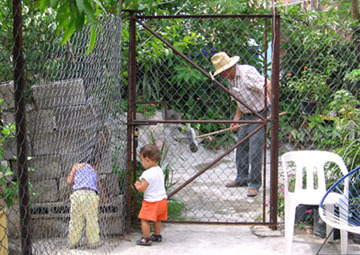
Sometimes circumstances in Mexico make it harder to care for a child. But overall, Mexico has given us many blessings as parents.
“Kook! Kook!” our son, standing on a chair and pointing emphatically at one particular spot on our kitchen shelves, kept repeating, “kook.”
“¿Qué quieres? No te entiendo. ¿Qué es ‘cuc’?” My husband was getting more and more confused, as he moved non-edible items around on the shelf.
“Do you want this?”
“No. Kook.”
In a process of elimination, my husband had moved almost everything away from the area indicated by our son — even most of the glass spice containers. Containing no fruit or snack items, the area in question was normally ignored by our toddler. That particular part of the shelf was almost bare, and still he hadn’t determined what our son wanted. In a last-ditch effort to help our son, he scooted the chair that our son was standing on closer so that our little one could touch whatever it was that he wanted. When he didn’t select anything, but continued to point, my husband finally said, “Well, son, I give up. I’m sorry, but I just do not know what you want,” and went back to chopping veggies.
Our son instantly turned to me, “¡Mamá, cuc!”
I decided to give the shelf one last look, and there it was. A cockroach, sitting on top of the last spice jar, waggling it’s antennae in broad sweeps. It was one of the outdoor kind, sometimes called a Palmetto Bug, with the big wings, which obviously had decided to come inside and try the domesticated life.
“Oh. A cockroach. Quick, get a paper towel.”
We each took our customary pest elimination stations. My husband holding the preferred killing device – in this case a folded paper towel, myself on back-up, holding a shoe over a possible escape route, and our son, observing from a safe distance. The cockroach met his end on the first try and we began joking. “We have ‘kooks’ in the kitchen.”
Roaches aren’t the only wildlife our son can identify. He knows three others, collectively referred to as “tee-tees,” making use of his term for ‘injury’ or ‘hurt.’ He stays well away from previously killed scorpions, left out for him to find and practice not touching. He loves to tell everyone about the “tee-tee” (a lovely, but very nasty fuzzy green caterpillar) that his father chopped out of the rose bush with pruning shears while he and I stood well back and said, “Oooo. Tee-tee. Don’t touch. Be careful Papá.” He also identifies snakes as “tee-tees” thanks to the little viper we found on the washing machine.
I showed him the black widow I recently killed on the screen door, but it was so mashed up, I don’t think he properly got a positive I.D. on that one. I’m just grateful they seem to hang out in the front door frame where I can periodically check for them.
A child’s social life
Our son, when he’s not scouting for vermin, keeps up on our neighbors’ activities. In fact, their joyful attentions have him convinced that he is famous. One of our neighbors is retired and often comes out to water his plants on the other side of our shared chain-link fence. Our son likes to stand nearby and observe him. Our neighbor always asks him to pass his little hand through the fence so that they can shake hands. “Saluda,” [Say hello] he tells him and corrects him if he tries to extend the left hand rather than the right. It was during one of these moments that he taught our son one of his first words, “agua.” Lately, they are practicing their whistles. When our neighbor comes out to water, he lets out a short, high-pitched whistle and my son replies with his own version, “wsht.”
Another neighbor is semi-retired and building a new house on his property. He is often outside shoveling sand and mixing cement. Our son stands at the gate and shouts for his attention. This neighbor says our son is his cuate [buddy] and always takes a moment to greet the little guy. He pays enough attention to our son that he understands our son’s pre-speaking conversation and always responds appropriately to what our son tells him.
A third neighbor has a small work-area under a tree in front of his house where he welds made-to-order window frames and metal railings. Every time we go by, he stops work and waves goodbye to our son, calling him by name and asking him where he is going, which is a common way of greeting a passing neighbor or friend in Mexico.
When we travel outside our neighborhood our son beams huge, toothy grins at complete strangers, expecting them to respond to him as warmly as his neighbors do. He doesn’t get discouraged when they don’t reply, but just uses more of the social skills that he has learned from our neighbors.
When I first considered becoming a parent in Mexico, one of my concerns was that my child might be stung by a scorpion. It is true that we sometimes find scorpions inside our house but, by cleaning behind and underneath furniture, we keep them away and have always seen them just as they are first entering our house from outside. As our son has grown older and successfully learned to be afraid of scorpions, I’ve become less fearful of a tragic sting.
Sometimes circumstances in Mexico make it harder to care for a child, but overall, Mexico has given us many blessings as parents. One of the most important blessings is that I will be able to stay at home with our son until he is ready to go to pre-school or day care. I’ve had no social pressure to return to work, but have had lots of support from other moms who understand that being a stay-at-home mom can sometimes be downright boring. In Mexico the weather’s always good and we can play outside with water, chalk, or toy cars. Everybody else has children, too, so if our child is over-tired or bored and making a scene in public there is almost always someone who will talk to him and help him have fun.
Like our neighbors, many people in Mexico understand and enjoy children. Children are spoken to directly from the moment that they are born. When our son was an infant and I first began carrying him with me to do errands, I was surprised at the way people greeted both of us. Not only would they say hello to me, but they would get into his line of sight and greet him too, telling him how precious and cute he was. After becoming accustomed to this, when I traveled to the U.S., I was again surprised at the way people treated him. This time I was surprised at their coldness. People would hold entire conversations right over his head and never so much as say hello to him. Not everyone was like this, of course, but enough people were that I noticed the difference between the two cultures. I got the impression that people’s general lack of exposure to children caused them to be embarrassed to talk to him. As a child he was a minority of sorts and people preferred to avoid him. Personally, if having my son be included in social interaction and thus learn positive social skills means I have to see the occasional ‘kook’ in my kitchen or scorpion on my patio, I’ll take the deal.

